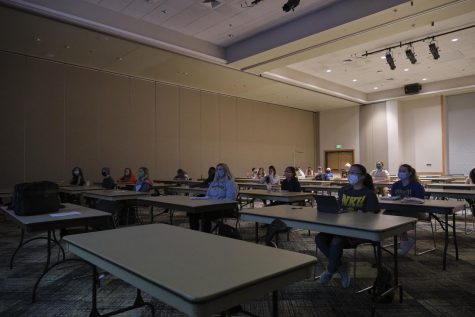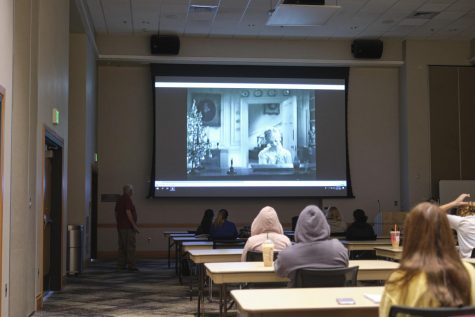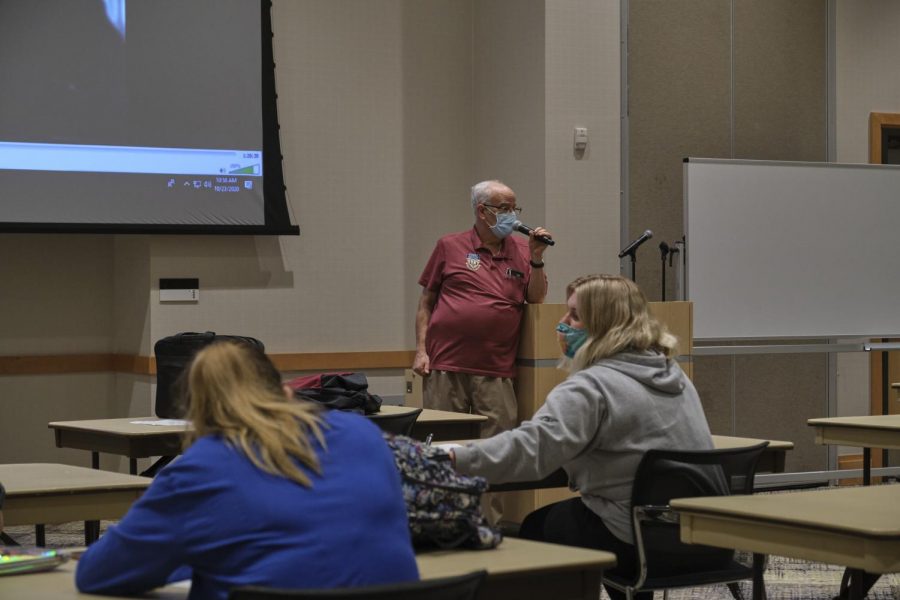Your donation will support the student journalists of Northern Kentucky University. Your contribution will allow us to purchase equipment and cover our annual website hosting costs.
Students, professors discuss learning during a pandemic
November 2, 2020
Under COVID-19 restrictions, classes at NKU have largely switched to online or hybrid formats for the Fall semester. According to The Northerner, 18 percent of classes with face-to-face components are still fully in-person while maintaining social distancing and mask wearing measures.
Rachel Zlatkin, a faculty member of the Honors College, is teaching a 300-level class called Storyweaving and Community in-person on Tuesdays and Thursdays.
“[The students] are on research teams, but the entire class is working on one large research project,” said Zlatkin. “So it would be hard for the class to be as collaborative as I would like it to be online, and I didn’t want to let COVID-19 interfere with students’ ability to collaborate, to learn more spontaneously and to talk to each other.”
Zlatkin said that she likes teaching on Zoom because she is more comfortable teaching from home. She gets to see her students’ faces and students have more access to her as a professor.
But Zlatkin found it difficult to bring the separate discussions on videos and in the Zoom chat into one. She also disliked how conversations and discussions are harder to have on Zoom.
“You cannot see anyone’s body language, so you can’t always tell when somebody wants to speak,” Zlatkin said. “So I do think with that kind of face-to-face class, even though we cannot see faces, we can see body language, we can hear people, we can tell when somebody wants to talk more, and discussion is just better under those circumstances.”
Zlatkin added that since her class was about community, engagement and interacting with other humans, an in-person class could provide students with better learning opportunities in spite of COVID-19.
“It’s harder to hear people talk because of the masks, and I have to wipe down desks, computers and light switches,” Zlatkin said in regards to her teaching experience this fall compared to previous semesters. “But other than that, it’s been pretty much as it’s always been.”
Philip Resnick, a part-time faculty member who is teaching three in-person religion courses on Mondays, Wednesdays and Fridays, has more problems with a face-to-face environment under COVID-19 restrictions.

“You can’t tell the attitude of the students just with their eyes,” Resnick said. “You can’t see their smile or frown. Students don’t interact, don’t talk to each other. Nobody is talking.”
According to Resnick, the masks make it harder for his students to project their voices. He also has to walk around the classroom with a microphone to deliver his lecture.
Even though it poses some challenges, Resnick said that he volunteered to teach in-person before the semester began.
“Face-to-face classes allow for more interaction,” Resnick said. “Hopefully we’ll come back to normal as soon as possible, get back to the interaction between students and teachers. Students are losing much by being online.”
Dominic Ruschman, a 70-year-old psychology major, is taking one of Philip Resnick’s classes this semester. Having completed two Bachelor’s degrees, he said he is more familiar with the traditional in-person classroom.
Although Ruschman understands the necessity and appeal of distance learning under COVID-19, he said a face-to-face environment offers a wealth of information that an online one may lack.
“I miss the in-class experience where professors go off on tangents and discuss their experience, their logic,” Ruschman said. “In a video-taped lecture, [the professor] doesn’t have anybody to ask him questions. It diminishes the opportunity for him to divert the lecture in another direction.”

Ruschman is part of the demographic most vulnerable to COVID-19. However, he said he is not at all worried about coming to in-person classes alongside his online ones.
“COVID tends to prey on people with comorbidities,” Ruschman said. “Personally I don’t worry about it. I realize COVID can kill [the elderly], but the flu can kill them too. They’re in a weakened, compromised position. Instead of being consumed with it, we should be used to the idea of vulnerability.”
Ruschman said he loves going to NKU, which he described as “a vibrant, intellectually stimulating environment.” He said he wants to use his education and academic credentials to help the people his age.
“At old age, you come to the realization that at any time in life, you could’ve died,” Ruschman added. “I can’t let that dictate my life. This is not unknown territory: I’ve spent 70 years in vulnerability. I love life. I want to make the most of it while I still can.”

